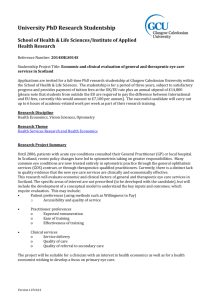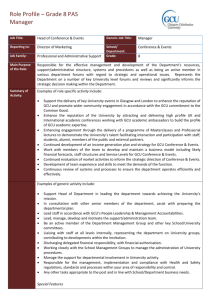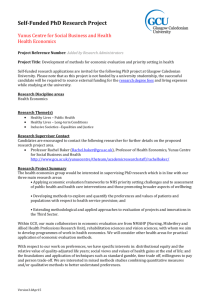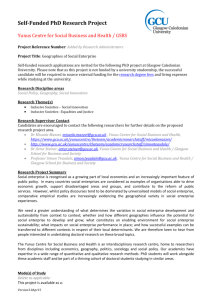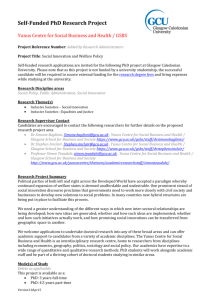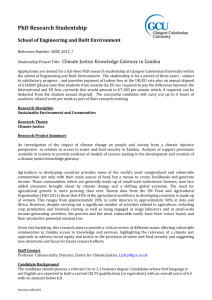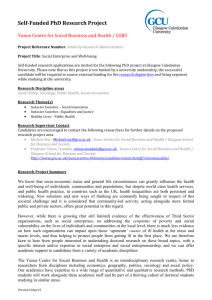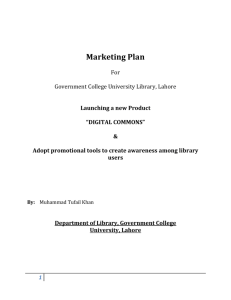Library Handbook - Georgia Christian University
advertisement
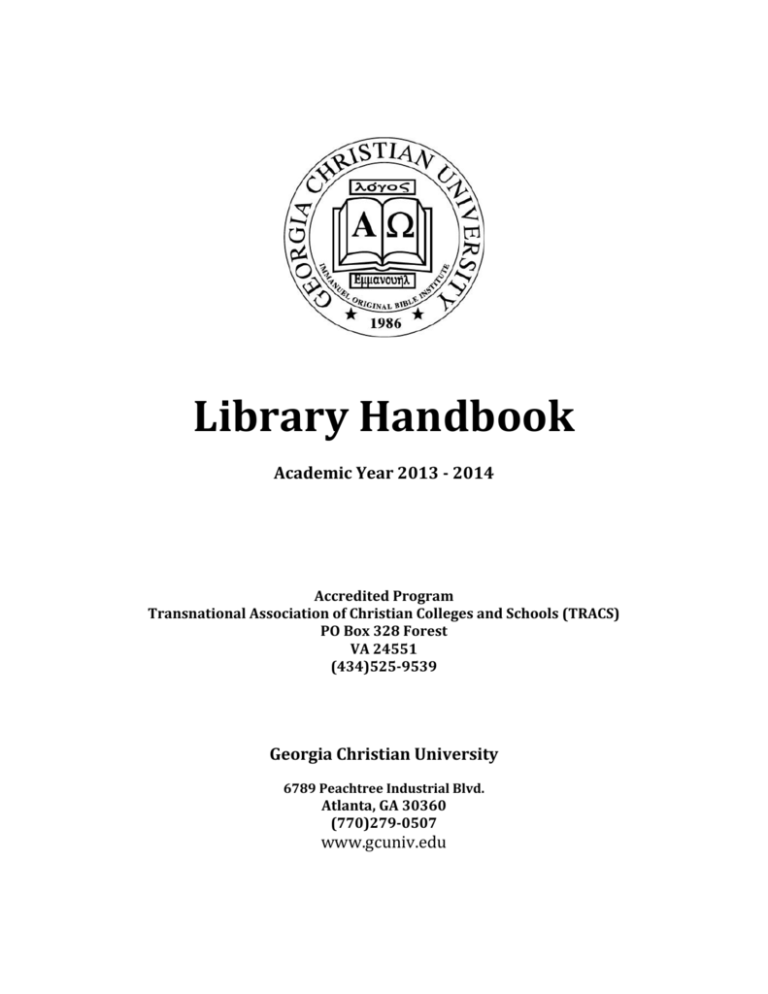
Library Handbook Academic Year 2013 - 2014 Accredited Program Transnational Association of Christian Colleges and Schools (TRACS) PO Box 328 Forest VA 24551 (434)525-9539 Georgia Christian University 6789 Peachtree Industrial Blvd. Atlanta, GA 30360 (770)279-0507 www.gcuniv.edu Table of Contents Welcome...................................................................................................................... .............1 General Information.............................................................................................................. ....1 Vision...................................................................................................................... ..............1 Mission................................................................................................... ...............................1 Biblical Foundations Statement..................................................................... .......................1 Objectives.............................................................................................. ...............................2 Core Values................................................................................. ..........................................2 Institutional Philosophy......................................................................... ...............................2 Philosophy of Education.......................................................................................................3 Statement of Non-Discrimination.........................................................................................3 Accreditation………………………………………………………………………………3 Introduction of Georgia Christian University.......................................................................4 School of Business (SB).................................................................................................. 4 School of Christianity (SC)..............................................................................................4 School of Divinity School (SD)……………………………….......................................4 School of Mission Studies (SMS)...................................................................... ...............5 School of Music (SM)…………………...........................................................................5 School of Oriental Medicine (SOM).................................................................................. 5 ESOL (English to the Speaker of Other Languages) ………………………………………6 History...................................................................................................................... ................6 Location...............................................................................................................................7 Institutional Requirement and Worship................................................................................ 8 Facilities................................................................................................................................8 Library...................................................................................................................... .................9 Library Mission Statement....................................................................................................9 Library Objectives........................................................................................................... ......9 Library Book Collection…...................................................................................................9 Electronic Library Resources……………………………………………………………….9 Collection Development……………………………………………………………………13 Library Conduct Policies……………………………………………………………………13 Food, Drink, Smoking………………………………………………………………………14 Hours of Operations..................................................................................................................14 Obtaining a Library Card.........................................................................................................14 Circulation Services……………………………………………………………………….…..14 Circulation Polices…………………………………………………………………….14 Reserves………………………………………………………………………………..15 Renewals…………………………………………………………………………..…..15 Overdue Materials…………………………………………………………….………15 Lost or Damaged Materials……………………………………………………………15 Classification System………………………………………….………………………………15 Reference………………………………………….………………………………16 Course reserve Books………………………………………….………………………………16 Group Study Room………………………………………….………………………………16 Research Room………………………………………….………………………… ……16 P h o t o c o p i e r s … … …… … … … … … …… …… … … … . … …… …… … … … … … …… 1 7 ii GCU Library Online Catalog……………………………….…………………………………17 Donation…………………………………………………………………..……………………17 Library Contact...........................................................................................................................17 Library Staff...............................................................................................................................17 iii Welcome This handbook has been prepared to acquaint you with Library resources and services, some of which have been designed especially for faculty and staff of Georgia Christian University. It is our desire to provide services and resources for you, both in conjunction with the teaching of classes and in areas of personal and professional growth and development. We welcome the opportunity to serve both the faculty and students. General Information Vision 1. Georgia Christian University is an educational institution to glorify God by equipping students who will proclaim God’s Word and to build up the body of Christ through education. GCU seeks to maintain an appropriate balance between training for effective vocational ministries and academics. Mission Statement The mission of the GCU is to train qualified students to be ministerial leaders with theological authenticity, and to educate them to be competent Christian leaders with Christian worldview to serve the church, communities, and the world through excellent Christian higher education. GCU serves its commitment to meet the educational needs of the diverse student body. Biblical Foundations Statement The Georgia Christian University (GCU) is a Christ centered institution of higher learning that is unwavering in its belief that the following doctrinal statements are foundational to the educational and spiritual growth of each GCU trustee, faculty, student, and staff member: The Bible is the divinely inspired Word of God. It is accurate, without error, reliable, and authoritative. The sixty-six Old and New Testaments canonical books are infallible; There is one eternal, transcendent, omnipotent, personal God that exists as the Trinity. Three persons, the Father, The Son, and the Holy Spirit; God, the Father, is the first person of the Trinity. He is the infinite Spirit sovereign. He is eternal, immutable, and unchangeable in all His attributes. He exists without any time or space limitation; Jesus Christ is a person in the Godhead. He is the Son of God. He is the perfect, sinless humanity and the absolute, full deity of the Lord Jesus Christ, indissolubly united in one divine-human person since His unique incarnation by miraculous conception and virgin birth; The third person of the Godhead who convicts, illuminates, regenerates, indwells, seals all believers in Christ, and fills those who yield to Him is the Holy Spirit. The Holy Spirit gives spiritual gifts to all believers; however, the manifestation of any particular gift is not required as evidence of salvation; The biblical record is the full historicity and perspicuity of primeval history, including the literal existence of Adam and Eve as the progenitors of all people, the literal fall and 1 resultant divine curse on the creation, the worldwide cataclysmic deluge, and the origin of nations and languages at the tower of Babel; Jesus Christ became the substitutionary and redemptive sacrifice for the sin of the world, through His literal physical death, burial, and resurrection, followed by His bodily ascension into heaven; The gift that comes from the eternal penalty of sin provided solely by the grace of God on the basis of the atoning death and resurrection of Christ, to be received only through personal faith in His person and work is Salvation; There will be a future, personal, bodily return of Jesus Christ to the earth to judge and purge sin, to establish His eternal Kingdom, and to consummate and fulfill His purposes in the works of creation and redemption with eternal rewards and punishments; There was a special creation of the existing space-time universe and all its basic systems and kinds of organisms in the six literal days of the creation week; and Satan exists as a personal, malevolent being who acts as tempter and accuser. Heaven and Hell. Two distinct, different, and real places. Hell is the place of eternal punishment, where all who die outside of Christ are confined in conscious torment for eternity. Objectives 1. To nurture everyone’s gift for Christian ministry, leadership in society, and service to the world. 2. To promote and encourage academic excellence, critical reflection, and involvement to the community service 3. Integrate cultural differences in effective academic development Core Values 1. God First, as the owner, creator and sustainer 2. Excellence in 3. Respect Teaching, Research, Scholarship and Management for Diverse Societies and to Fight for Social Justice 4. Commitment to Life-Long Learning and Teaching 5. Effective Career Development Opportunities Institutional Philosophy Georgia Christian University emphasizes and believes in the Triune God: eternal, transcendent, omnipotent, and personal. God the Father, the first person of the Divine Trinity, is infinite, sovereign, and unchangeable in all his attributes. GCU believes in the sinless humanity and the absolute, full deity of Christ Jesus, indissolubly united in one divine-human person since his unique incarnation by miraculous conception and virgin birth. Holy Spirit, the Third person of trinity resides among us always. 2 GCU believes that the Bible is the Word of God, and as such, it is our only infallible rule of faith and practice. We believe in the plenary, verbal inspiration of the Scriptures by the Holy Spirit; thus, we affirm the inerrancy of the original manuscripts whose objective truth is our responsibility to interpret in accordance with the principles of Scriptures and to proclaim in accordance with the imperatives of the Gospel. GCU emphasizes and believes that the universe is God’s creation and his handiwork. We believe that God created human beings in His own image. Philosophy of Education Georgia Christian University believes that God calls each individual to prepare intellectually and spiritually to share Jesus Christ throughout the world. The University affirms that curriculum is designed to reflect the Spirit of Christ in all academic programs as follow: 1. Christ-centered; 2. Based on the Bible; 3. Academically relevant to degree programs that are meeting the needs of the world; 4. Pursuing academic excellence; 5. Taught by faculty who are Christians and comply with the institution’s doctrinal beliefs; 6. Taught by faculty who are dedicated to quality higher education; 7. Taught by faculty who are academically credentialed; 8. Taught in an environment conducive to academic and spiritual growth; 9. Designed to integrate the academic training with Christian commitment; and 10. Based on Christian belief in God’s mission for the world. Statement of Non-Discrimination Georgia Christian University does not discriminate against race and national origin in accordance with Title VI of the Civil Rights Act of 1964. Georgia Christian University does not discriminate against age according to the Age Discrimination Act of 1975. Also, GCU does not discriminate against sex in accordance with Title IX of the Education Amendments of 1972. Furthermore, GCU will not discriminate against disability or religion. However, as a Christian education institute all students are required to study and attend chapel regardless of their religion. Accreditation The Georgia Christian University is a member of the Transnational Association of Christian Colleges and Schools (TRACS) [PO Box 328, Forest, VA 24551; Telephone: 434.525.9539; e-mail: info@tracs.org] having been awarded Candidate status as a Category IV institution by the TRACS Accreditation Commission on April 7, 2009, and fully accredited member institution on November 6, 2012 Commission Meeting; this status is effective for a period of five years. 3 TRACS is recognized by the United States Department of Education (USDE), the Council for Higher Education Accreditation (CHEA) and the International Network for Quality Assurance Agencies in Higher Education (INQAAHE). GCU has become an associate member school of the ATS (Association of Rheological Schools) in June, 2012. INTRODUCTION OF GEROGIA CHRISTIAN UNIVERSITY The University’s educational program consists of six major schools: Business, Christianity, Divinity, Mission Studies, Music, Oriental Medicine and ESOL program. School of Business (SB) The School of Business courses offered at Georgia Christian University through SBM are designed for students in need of gaining a mix of theoretical and practical management knowledge and skills that will enable them to work as professional managers after they complete the given courses during their academic years at GCU. School of Christianity (SC) The purpose of the School of Christianity is to prepare undergraduate students educational leadership in the local churches of all age groups (elderly, adult, young adult, and youth) as lay leaders or vocational ministers. SC stresses education in multi-cultural contexts. This is done on the theoretical and practical levels by implementing educational policies and programs that promote the integration of structurally excluded ethnic groups. Thus, SC’s curriculum reflects the cultures, ethos, and experiences of diverse groups. The program is designed to enable students to strive for excellence through development of their own philosophy of educational ministry based on the Biblical principles and theological reflections of multiethnic/multicultural issues. School of Divinity (SD) Mission of the School: The mission of the School of Divinity of GCU is to educate and train qualified students for ministerial, educational, and missionary leadership for Christ and His Kingdom through rigorous professional programs of theological studies and personal and spiritual disciplines. The School is, as a theological school following the Reformed-evangelical tradition, seeking in particular to serve the Korean/Korean-American churches and the global Christian community. The value of the School’s mission is very consistent with the University’s Vision and Mission Statement. Since the formation of GCU, the theological programs, now being Schools of Christianity and Divinity, have played an essential and central role in shaping and realizing the University’s foundational spirit and institutional vision. In other words, GCU as a whole relies greatly on the theological department, especially the School of Divinity, not only to sustain its Christian identity and values but to provide leadership in educating its students in biblical perspectives. Educational Core Values: The School of Divinity embraces the five components of GCU’s education core values stated as follows: 4 1. God is the Primary being, the Owner, Creator, and Sustainer; 2. Excellence in Teaching, Research, Scholarship, and Management; 3. Respect for diverse societies, willing to engage in struggle for Justice; 4. Having a lifelong commitment to learning and teaching; 5. Providing a foundation for effective career development opportunities. Through lectures and chapel activities, the School’s constituents are kept informed of its purpose and core values. Degree Programs: The School of Divinity focuses on strengthening its Masters (4) and Doctoral (1) degree programs: Master of Arts in Theological Studies (MATS), Master of Arts in Christian Education (MACE), Master of Arts in Mission Studies and World Christianity (MAMSWC), Master of Divinity (M.Div.), and Doctor of Ministry (D.Min.). The MATS program is designed to explore faith and to understand human lives and a variety of ministry career choices from a theological perspective; the MACE program is designed to equip and prepare students to become competent leaders in the educational ministries of the churches; the MAMSWC program is designed to integrate studies in academic and practical theology in the area of modern mission studies, with a concentration in either urban or global studies; the M.Div. program is designed to educate and train dedicated Christians who seek to serve as ordained ministers, evangelists, missionaries, and other ministry leaders and; the D. Min. program is designed to educate experienced ministers who are seeking to enhance their ministries with advanced theological understanding and research. The curriculum of the School is composed mainly of four basic emphases: religious heritage, cultural context, personal and spiritual formation, and capacity for ministerial and public leadership. Through its curriculum program, the School’s graduates are expected to: 1. Be faithful interpreters of the Bible, informed by contemporary biblical scholarship in the area of biblical studies; and of the Christian faith and practice, informed by Reformed-evangelical heritage and history. 2. Be responsible communicators of diverse social and cultural contexts, informed by ethnic/cultural studies from biblical, missionary, and educational perspectives. 3. Be truthful Disciples of Christ, regularly practicing personal and spiritual maturity and observing spiritual discipline. 4. Be competent and efficient leaders for preaching, leading worship, counseling, and evangelism in the church and other settings School of Mission Studies (SMS) SMS, while examining the traditional methods in mission, refocuses on the enculturation and the contextualization of the Gospel message. SMS attempts to emphasize comparative approaches of mission and cooperative efforts of all non-Western mission forces in partnership with Western rich experiences and resources for world evangelization. The program includes biblical and theological foundations, cross-cultural perspectives, and analysis of historical and contemporary issues in mission, ministry skills, and partnership opportunities in mission. School of Music (SM) The purposes of SM are: (1) to train those who are interested in gaining proficiency in music as a professional/non-professional musician, and (2) to provide those who are interested in church music, both theological and liturgical. SM provides students with practical performance skills as well as training in listening, conducting, teaching, and music composition. School of Oriental Medicine (SOM) 5 The primary objective of School of Oriental Medicine at Georgia Christian University is to cultivate compatible herb doctors and oriental medicine practitioners equipped with knowledge and clinical competence. Continual studies and clinical experiments by GCU’s exceptional teaching staff and research structure at top-notch facility shall modernize the field of Oriental Medicine and further contribute to the society in needs of gaining a mix of theoretical and practical knowledge and skill. ESOL (English to the Speakers of Other Languages) The ESOL program at Georgia Christian University provides students with the language skills they need to accomplish their goals. These goals include: Studying for a degree in an English-speaking university Improving job skills or job competencies Making life easier in the English speaking world Consequently, we offer courses in both academic and non-academic English and cover reading, writing, listening, and speaking. HISTORY Georgia Christian University had its beginning as the Immanuel Original Bible Institute in Alabama in the year of 1986. Its sole focus was on studying Biblical languages and Biblical interpretation. In 1995, the institute moved to Alpharetta, a northern metropolitan area of Atlanta, and changed its name to School of Theological Seminary in Georgia. In 1998, the school sought a larger space to build a bigger campus and purchased a location near the city of Lawrenceville, Georgia as well as the former Norcross facility. A new board of trustees was formed to run an efficient theological institution. In the same year, the new board decided not only to change its name to Georgia School of Theology, but also to study the potentiality of a joint program with the Johnson C. Smith Theological Seminary, one of the Theological institutions of the United States Presbyterian Church. This partnership consultation between the Johnson C. Smith Theological Seminary and Georgia School of Theology was short-lived. On April 5, 2002, Georgia School of Theology was certified to begin issuing and applying for I-20 student visas from the United States Citizenship and Immigration Services (USCIS), formerly known as the Immigration and Naturalization Services (INS). In August 2002, the Georgia School of Theology and what is now Georgia Christian University was divided into two separate institutions, the former a religiously exempt school and the latter an authorized university. On June 1, 2003, Georgia Christian University’s Associate, Bachelor’s and Master’s programs in Music, Theology, Mission, and Christian Education were approved by the Georgia Nonpublic Postsecondary Education Commission. In July of 2004, Georgia Christian University moved to the former campus in Lilburn and expanded the campus in 2005. Also, in 2005, NPEC authorized MAOM courses at Georgia Christian University for Oriental Medicine. In 2006, the student association body was formed to guarantee better campus and student lives at GCU. Also, the graduates of GCU reformed their Georgia Christian University Alumni Association the same year. In 2007, to promote Georgia Christian University, the Alumni Association successfully organized the Spirituality Conference, and in October 2007, GCU was authorized to offer academic programs in Business Management with BA, Master’s Degree in Divinity, and Doctoral Degree in Ministry. For an on-going task, GCU has submitted an application to a National Accreditation 6 Body (TRACS) for an evaluation, and in April 2009, GCU was approved of Candidate Status by TRACS (Transnational Association of Christian Colleges and Schools), and thriving its best efforts to achieve higher educational goal set forward by prestigious faculty members and administrative staff, also including community members and churches. In March of 2010, GCU and Honam Theological University & Seminary in Kwangju, Korea became sister institutions for mutual growth and academic advancement. In May of 2011, The Georgia Christian University is granted a provisional certification for the Federal Aid (Title IV program) from the Atlanta School Participation Team of U. S. Department of Education (USDE). In 2011, GCU has acquired and moved to a new campus site at 6789 Peachtree Industrial Blvd., Atlanta, GA 30360 to facilitate growing demands and needs for educational environment. In June of 2012, GCU School of Divinity became an associate member school of the ATS (Association of Theological School). In the year of 2012, GCU has exchanged MOUs with three Universities in Korea in becoming sister institutions: Handong Global University in Pohang (July), Youngnam Theological University & Seminary in Kyungsan (September), & Daejeon Theological University in Daejeon (October). In November of 2012, GCU has become and recognized as a full accredited member school of TRACS. In January of 2013, GCU has exchanged a MOU with Seoul Jangshin University located in Kwangju, Kyeongki-do in becoming sister institutions. In February of 2014, GCU School of Divinity was granted Candidate membership by ATS. GCU offers our heartfelt appreciation, glory and praise to our Lord Jesus Christ for establishing and raising Georgia Christian University. The years of history of GCU have witnessed the rise of Christian leaders armed with a biblical worldview, and teaching the Word of God. Location Georgia Christian University is located in the city of Atlanta, a northeastern part of Atlanta. Atlanta's population is approximately 3.5 million, fifty thousand of which is Korean-American. Atlanta has been ranked as one of the best places to do business and one of the most livable cities in the world. Metro Atlanta boasts beautiful residential areas, parks and playgrounds, fine schools and universities, and growing churches. Students and their families will enjoy Stone Mountain Park and the Martin Luther King Jr. National Historic Site. The city also supports a wide variety of cultural activities as well as various sports. In 1996, the Olympic Games were held in Atlanta. Atlanta is also the business capital of the Southeast. Its banks, offices, hospitals, and industries provide numerous employment opportunities for citizens. The city has many trees and beautiful flowers, and a mild climate throughout the year. Located approximately forty miles from the school is the Atlanta/Hartsfield International Airport, one of the world's busiest airports. 7 INSTITUTIONAL REQUIREMENT (CHAPEL WORSHIP SERVICE) GCU opts for worship experience as Institutional Requirement for the purpose of enhancing the spiritual growth. Worship is the spiritual center of University life. To satisfy Institutional Requirement (“IR”), throughout the academic year, worship services are held three times a week. All students are required to attend one of three. All students are also welcome to join the Bible studies in consultation with Chaplain and worship services held on Tuesdays, Saturdays, and Sundays. The chaplain, in cooperation with faculty and students, leads chapel. The chaplain also is involved in conducting in Commencement, Graduation, Easter Week, and Thanksgiving Week) as part of worship experience. The student body forms several musical groups to enrich services. The chapel choir is open to all students. The music majors may get credits for being a member of the choir (Pass/Fail grade). All students who do not meet this requirement (missing more than 3 sessions) are liable to dismissal because the failure of IR will be “F” grade. Facilities The Library GCU has made every effort to create a viable library for students’ study and research. So far, approximately, thirty thousand books have been purchased, collected, or donated. Currently, almost all the books are bar-coded and cataloged. Measures taken to improve the library system are as follows: (1) Contacting for implementation of Georgia Virtual Library (known as Galileo), (2) Regular book purchases, as suggested by Faculty members, and institutional purchases from annual conferences such as that of the Society of Biblical Literature and the Association of American Religion, (3) For the doctoral programs, special arrangements with institutions such as Emory Divinity School, Columbia Seminary, and the International Theological Center, and (4) continuous reports of the Library Director and staff. The Library Committee continually studies plans for improving the library facilities and its logistics. Physical Premises and Finances The president, in consultation with the Board of Trustees, is responsible for planning on purchasing or leasing additional buildings as well as for repairing, renovating, and replacing facilities. The annual budget supports maintaining and operating the physical premises of the school. The president oversees the whole process of maintaining the facilities of the School, and the president oversees the annual budget as well as funding resources, donations & tuition. Institution’s Structural Development Plan During the years of operations, GCU has exerted its best to develop and improve educational environment for students and research atmosphere for faculty and staff. GCU is currently operating more than 20 classrooms all throughout the year and several audition halls including research facilities where faculty members can meet their students and proceed with their academic researches. Even though it may sound promising and enough for a small college, GCU is still acting vigorously to acquire more and better facilities to guarantee acceptable environment for students and faculties. GCU has expanded the library and classrooms to meet the demand from students and faculty 8 members during the academic year of 2011-2012 through purchasing adjacent land and office structure in the City of Atlanta. Further development plan includes acquiring additional classroom facilities in the nearby cities for better commuting opportunities. Library Library Mission Statement The mission of GCU Library is to provide information services and biblical resources to support the scholarly and information needs of the GCU community and to share resources with those outside the University by requesting, organizing, and maintaining an excellent collection of print and non-print resources and providing instruction on and assistance with the acquisition of information to library users and by creating an academic atmosphere that fosters lifelong learning and intellectual inquiry. Library Objectives To collect all materials for classes and research needs To organize resources for successful and efficient access To assist users in finding the knowledge and information resources as needed To teach knowledge and information research skills To maintain variety of materials to provide scholastic and cultural environment To promote cultural, scholastic and spiritual enhancement in the community through sharing all materials with the local residents To establish Inter-Library Loan agreements to assist students’ learning experience, and To build community relationships through use of library facilities and community activities Library Book Collection There are approximately 28,500 printed titles in the GCU Library, and the number is ever growing. Those are closely tied to the GCU curriculum and aim to support the subject areas covered by GCU’s academic programs. Many books are written in Korean for our students’ convenience and to promote of cultural integration. New books are first placed on the New Arrivals shelves and can be checked out from them as well. GCU’s collection is particularly strong in the biblical studies areas. The research information system is accessible at the official website of GCU Library, and multiple computers are ready to serve the immediate needs of visitors to find those in their interests, and 36 additional computers with Internet access are ready for students’ and faculty members’ use at the GCU Library Annexed Computer Lab. Electronic Library Resources To provide the students greater access to library resources, GCU has enhanced its electronic resources. These resources allow students free web searching, access to electronic sites, and e-book collections. Apologetics (click the desired source) 9 o Answers in Genesis o Apologetics.org o C.S. Lewis o Christian Answers Network o Christian Apologetics and Research Ministry o Creation Research Society o Institute for Creation Research o Official mirror site to Stephen Downes’ Guide to Logical Fallacies o Probe Ministries o Stand to Reason o Summit Ministries o The Berean Call o Watchman Fellowship American History and Government (click the desired source) o American History Documents o American Textbook Council o Constitution Day Resources o Wall Builders Bible Software (click the desired source) o Bible Databases o Bible on the Web o Bible Pro o BibleWorks o CrossWalk.com o E-Sword o Logos Bible Software o WORDsearch Bible Studies (click the desired source) o Abide in Christ o Bible Versions and Translations o Bible.org o ChristianityToday.com o CrossSearch.com o IVP | Quiet Time Bible Study o Resources for Biblical Studies o Sonic Light Christian Education (click the desired source) o Christian Classics Ethereal Library o Directory of Christian Organizations o Guide to Early Church Documents o North American Professors of Christian Education o Religion Online Church Growth (click the desired source) o Church Smart - Strategic Ministry Tools for Church Leaders 10 o Elmer Towns | Spiritual Breakthroughs o Global Harvest Ministries o The Barna Group o The Church Growth Institute Christian News (click the desired source) o Agape Press o CBN News o Maranatha Christian Journal o Southern Baptist Convention o The Baptist Press o Worthy News Church History (click the desired source) o Christian Classics Ethereal Library o Guide to Early Church Documents o History of the Church by Philip Schaff o Resource Pages for Biblical Studies o The Master's Seminary: Church History Resources o The Works of Augustine o Theology Website: New Testament Study Helps o Wikipedia: Church History Computer Science (click the desired source) o Citeseer.ist: Scientific Literature Digital Library o Computer Science Research Index o IBM Research o TeachIS.org o University at Albany: Computer Science Contemporary Issues (click the desired source) o Citizen Link o List of Think Tanks o Middle East - History, Society, and Culture Resources Critical Thinking (click the desired source) o Critical Thinking (from Wikipedia) o Critical Thinking Core Concepts o Critical Thinking What Is It Good for? (In Fact, What Is It?) o Critical Thinking: What It Is and Why It Counts o Definition of Critical Thinking o Facts, opinions and reasoned judgments o Strategies for Teaching Critical Thinking o Teaching Critical Thinking through Online Discussions o The Critical Thinking Community Devotionals (click the desired source) o My Utmost for His Highest 11 History (click the desired source) o History of Art o Religion Online Leadership (click the desired source) o Management Help Library Links (click the desired source) o American Religion Data Archive o Databases and E-Resources through the Library of Congress o Full Text Books o Library of Congress o Religion Online o Resource Pages for Biblical Studies o Teaching undergrads WEB evaluation: A guide for library instruction o The Jewish Virtual Library o Virtual Religion Index o ERIC Religion (click the desired source) o Association of Religion Data Archives o Digital Quaker Collection o Full Text Books o Internet sites used in Following Muhammad: Rethinking Islam in the Contemporary World by Carl W. Ernst o Religion Online o The Jewish Virtual Library o The Religious Movements Homepage@ The University of Virginia o Virtual Religion Index o American Religion Data Archive o History in the News: Middle East History, Society, and Culture Resources o Internet sites used in Following Muhammad: Rethinking Islam in the Contemporary World by Carl W. Ernst o The Religious Movements Homepage@ The University of Virginia o Resource Pages for Biblical Studies Sociology (click the desired source) o Internet sites used in Following Muhammad: Rethinking Islam in the Contemporary World by Carl W. Ernst o Middle East - History, Society, and Culture Resources o Religion Online o The Religious Movements Homepage@ The University of Virginia o Virtual Religion Index Theology (click the desired source) o Digital Quaker Collection 12 o Full Text Books Women’s Ministry (click the desired source) o Bibliography World Facts (click the desired source) o Association of Religion Data Archives o Background Notes o The World Factbook 2006 Collection Development The librarian’s primary responsibility is to oversee acquisition process for multi-lingual books or references, particularly, Korean-written, Chinese-written, and Spanish-written. In the process of acquisition, librarian receives recommendations from faculty, staff, students, alumni, and community members. Selection of acquisitions for both print, non-print materials including audio-visual collections to develop the library collections is shared with GCU Library Committee. Faculty and staff are strongly recommended to submit requests for library acquisition for textbooks, reading materials, journals, and faculty recommendations receive priority status in collection development selections. Library conduct policies In order to maintain a quiet learning environment, any behavior in the library that is abusive or disruptive will not be tolerated at any time. The library has policy of zero-tolerance on any abusive or disruptive behavior, and it adheres to the university Student Code of Conduct. While in the GCU Library, please observe the following guidelines: 1. Library materials, equipment or property must not be taken from the library without proper check-out process or authorization. 2. Users should not replace books on the shelves. Please leave them on the circulation desk or on the reading tables. 3. Users must not mark, underline, remove or fold pages, remove binding, or use post-its and paper clips. 4. Please avoid theft of personal belongings by not leaving them unattended. 5. Users are responsible for their personal property. 6. Users must not enter areas of the Library restricted to authorized personnel. 7. Users must keep noise level to a minimum. 8. Users are asked to mute all electronic devices (including cellular phones or computer devices). 9. Users shall help keep the Library building clean by disposing of all trash properly. 10. Computer users should not change any computer settings or download files to the hard disks of computers. 11. Children under the age of 13 must be accompanied by and supervised by an adult. 12. Bicycles, roller blades, and skateboards must remain outdoors. 13. Solicitation is not allowed at any times. 14. No overt or explicit physical sexual behavior will be allowed, and the offender of this 13 behavior will be reported to proper authorities immediately. 15. Only trained animal to assist the disabled are permitted in the library facility. * Please remember that many of the library materials you use are irreplaceable. Please treat them carefully so they will be available for future students. Food, Drink, Smoking Food and drinks are allowed in the library only by the permission from the librarian to minimize the damage to materials and equipment. Drinks in covered containers and small items of packaged food may be taken to study areas. No food or drink is permitted near library computers. There is a “No Smoking” policy inside the Library. Hours of Operations Monday through Saturday Sunday 9am~1pm & 2pm~7pm Closed * Hours may vary during the summer, between semesters, and on holidays. * Hours are subject to change without notice. Any changes in operation hours are published both at the official Library website and public bulletin board around the Library premises. Obtaining a Library Card Students, faculty and staff members MUST present their GCU identification cards to check out library materials. A valid GCU ID card is the library card for students, faculty and staff. If you lose your ID card notify the officers at the Office of Admissions and Records immediately. You may purchase a replacement card at the Office of Business Affairs for $10.00. Community members may apply for a community member library card. For a community member, a copy of driver’s license and $20 processing fee are required to obtain a library card. There are no annual fees. Circulation Services The Circulation Desk is located at the entrance of the Library. A staff member is available during all hours of operation to offer directions and instructions regarding the location of library materials and to provide circulation services. A librarian will help you to locate the materials you are searching for and check-out status of the material shall be available by an inquiry including the due date. 14 Circulation Policies Faculty Members Staff Members Doctoral Students Students Community Users Maximum of 20 items per check-out, Circulation period for 2 month, 1 Renewal of 14 days 10 items, 1 month, 1 renewal of 1 month 10 items, 1 month, 1 renewal of 10 days 5 items, 2 weeks, 1 renewal of 2 weeks 5 items, 2 weeks, 1 renewal of 2 weeks Check Out: To check out materials, a student must show a GCU student ID to the staff at the Circulation Desk. Return: Items are to be retuned on or before the due date to the Circulation Desk. Reserves: To better serve all library users, GCU library has reserve system in place via website. If you are interested in a material checked out by others, you can use this system to reserve your turn. Renewals: Items can be renewed unless someone has placed a hold on the item. Renewals may be made either online, by phone or in person at the circulation desk. Overdue Materials: Overdue notices are sent to individuals as courtesy reminders. All overdue materials are subject to 10 cents per book per day charge and immediate suspension of GCU Library membership. And failure to return library materials will result in a “block” being placed on their record. If they are “blocked” they cannot check out additional books, order a transcript, register for additional courses, or apply for financial services including installment-payment plan (ie. Deferred-Payment). Lost or Damaged Materials: Patrons are responsible for the safety, proper use and return of all the library materials charged on their card. In the event that materials are damaged, destroyed or lost, they will need to pay the book’s purchase cost in addition to $10 processing fee. Adequate clearance of fines and return of materials is necessary before registration or graduation. Rare books are not available for check-out, and are to use only within the library facilities. Holds: Patrons may request that a book which is already checked out be placed on hold. The book will not be recalled but will be held when it is returned to the library. It cannot be renewed. The librarian will attempt to contact the patron requesting the hold. Classification System The books are shelved alphabetically according to the classification system. The following outline shows the broad subject classes. Classification Outline 000 General Works 100 Philosophy 200 Religion 300 Social Science 15 400 500 600 700 800 900 Pure Science Technology Arts Language Literature History Subdivision Example of Library Classification 231 Christian Theology, Doctrinal Theology 232 Christology 233 Bible 234 Devotional Literature, Religious Life 235 Sermon, Missiology, Christian Education, Ministry 236 Ecclesiology 237 Worship, Ritual and Sacrament 238 Denomination and Sect of the Christian Church 239 Judaism A book have only one classification number, which determines that book’s place on the shelf—even though it has material on several subjects. The call number is located on the spine of the book and is the book’s address. The call number of each book is composed of the classification number, author letter and title letter. The call number for The New Context for Ministry by Lyle E. Schaller might be 235.3 (Classification number for Ministry) S298T(S is first letter of the author, T is the first letter of the title) Many books will have the same classification number and will be arranged by author and title within the number. Reference A reference book is identified as one used for reference and not meant to be read through, like dictionaries and encyclopedias. Reference books have to be used inside of the Library. Course Reserve Books Course Reserve Materials are located in front of the circulation desk and include both those items placed on course reserve by faculty members and items selected by library staff. Loan periods are determined by the faculty members. Group Study Room Study room is available for groups of two or more who need to confer on group projects, and the use of the Group Study Room at the Library is on a first-come, first-served basis. However, reservation through the Circulation Desk is available under the Librarian’s supervision. Research Room 16 Research Room has 2 computers with word-processing capability and the Internet access. Computers are available for student to use on a first-come, first-served basis during regular Library hours. A Printer and a scanner are available for anyone’s use in the Research Room. Students are encouraged to bring their own papers for printing purposes. Photocopiers Photocopiers are available for the convenience of students. Students can purchase Copy cards at the Circulation Desk. The cost is five cents per page. GCU Library Online Catalog The GCU library website address is http://www.library.gcuniv.edu. The online catalog will help you find any materials in the GCU collection. You can look for items by author, title, subject or keyword. Keyword searches will search all fields describing a book including title, subject headings and any description that may be in the record. Once you have located a book you can click on the title to view more information about the book including the call number, location, and current status of the book. The status will tell you if the book is on the shelf or checked out to another patron. To access your library account, type your GCU ID number. Donation GCU Library welcomes all members of the community who like to share their love for all reading materials. We are looking for variety of books including fiction, non-fiction, religious, arts, history, biographical, biblical and references. If you like to donate, please contact the librarian. Library Contact Address: 6789 Peachtree Industrial Blvd. Atlanta, GA 30360 Website: http://library.gcuniv.edu Phone: 770-220-7913 Library Staff Jong Sik Chang, Ph.D., Senior Director of the Library & Information System Keum Ju Cho, M.S., Director of the Library Email: library@gcuniv.edu 17
